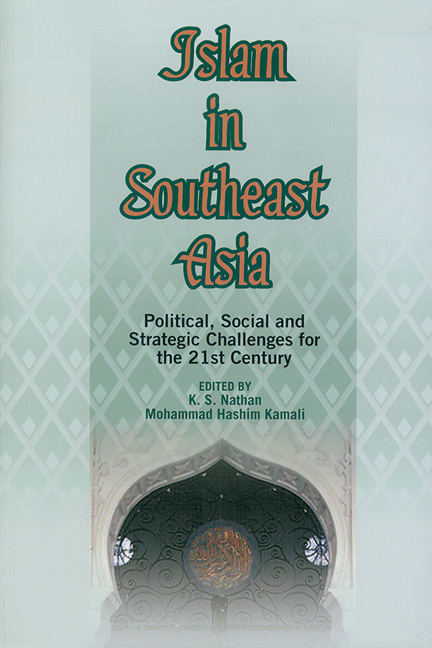Book contents
- Frontmatter
- Contents
- Preface
- Introduction: Understanding Political Islam Post-September 11
- PART ONE ISLAMIC DOCTRINE, HISTORY, GROWTH AND INSTITUTIONS IN SOUTHEAST ASIA
- PART TWO POLITICS, GOVERNANCE, CIVIL SOCIETY AND GENDER ISSUES IN SOUTHEAST ASIAN ISLAM
- 6 Islam Embedded: ‘Moderate’ Political Islam and Governance in the Malay World
- 7 Law-Making in the Name of Islam: Implications for Democratic Governance
- 8 Is It Always Islam versus Civil Society?
- 9 Islamization, Civil Society and Religious Minorities in Malaysia
- 10 Islam and Gender: Reading Equality and Patriarchy
- PART THREE MODERNIZATION, GLOBALIZATION AND THE ‘ISLAMIC STATE’ DEBATE IN SOUTHEAST ASIA
- PART FOUR IMPACT OF SEPTEMBER 11 ON ISLAMIC THOUGHT AND PRACTICE
- CONCLUSION: Addressing the Challenge of Political Islam in Southeast Asia
- Note on Contributors
- About the Editors
- Index
6 - Islam Embedded: ‘Moderate’ Political Islam and Governance in the Malay World
from PART TWO - POLITICS, GOVERNANCE, CIVIL SOCIETY AND GENDER ISSUES IN SOUTHEAST ASIAN ISLAM
Published online by Cambridge University Press: 03 November 2017
- Frontmatter
- Contents
- Preface
- Introduction: Understanding Political Islam Post-September 11
- PART ONE ISLAMIC DOCTRINE, HISTORY, GROWTH AND INSTITUTIONS IN SOUTHEAST ASIA
- PART TWO POLITICS, GOVERNANCE, CIVIL SOCIETY AND GENDER ISSUES IN SOUTHEAST ASIAN ISLAM
- 6 Islam Embedded: ‘Moderate’ Political Islam and Governance in the Malay World
- 7 Law-Making in the Name of Islam: Implications for Democratic Governance
- 8 Is It Always Islam versus Civil Society?
- 9 Islamization, Civil Society and Religious Minorities in Malaysia
- 10 Islam and Gender: Reading Equality and Patriarchy
- PART THREE MODERNIZATION, GLOBALIZATION AND THE ‘ISLAMIC STATE’ DEBATE IN SOUTHEAST ASIA
- PART FOUR IMPACT OF SEPTEMBER 11 ON ISLAMIC THOUGHT AND PRACTICE
- CONCLUSION: Addressing the Challenge of Political Islam in Southeast Asia
- Note on Contributors
- About the Editors
- Index
Summary
INTRODUCTION
The “Malay world” is a riverine-maritime complex of contemporary Southeast Asia, a geo-body often compared to the Mediterranean because of their many similarities, especially, as historical and civilizational “sites” where many great world civilizations, both from the East and West, interacted and crossfertilized. Physically, the Malay world is located at the centre of the region known as Southeast Asia, where 90 per cent of over 250 million of its population are Muslims who speak the Malay language and its various dialects. They inhabit present-day Malaysia, Indonesia, Brunei, Singapore, Southern Thailand, Southern Philippines and Southern Cambodia. Therefore, it is the largest single linguistic group of Muslims, with Malay as the lingua franca, and even larger than the Arab-speaking Muslims of the Middle East and North Africa put together. This fact is rarely highlighted nor publicly known to the majority of Muslims around the world. With such a huge population of Muslims residing in this vibrant region, it is not unexpected that many Western countries fear it may become a new “nest of global terrorists”. The fear is largely unfounded because historically the majority of them have been law-abiding and democracy-respecting citizens, in short, practising a moderate Islam. This chapter examines the origin and construction of the “moderateness”.
The first part of the chapter will focus on past and present discourse amongst social scientists, specializing on Southeast Asia, on the ontological nature of the Malay world Islam. The discussion revolves around two major conceptualizations-cum-analyses put forward by two world famous scholars, namely, Clifford Geertz, the cultural anthropologist from Princeton University, and William Roff, the historian from Columbia University, both of the United States. We will offer an alternative conceptualization upon which our subsequent discussion in this chapter shall be based. The second part will briefly deal with a central theme that has dominated analyses on global Islam in the last three decades, namely, “political Islam”. Indeed, the theme has become the framework within which the phenomenon labelled as “the revival of Islam” and the character of Muslim communities implicated in the movement, have been located, rigorously analyzed and have become the subject of numerous animated discussions and concerns worldwide. The third part is an empirical description of the Malaysian experience.
- Type
- Chapter
- Information
- Islam in Southeast AsiaPolitical, Social and Strategic Challenges for the 21st Century, pp. 103 - 120Publisher: ISEAS–Yusof Ishak InstitutePrint publication year: 2005

